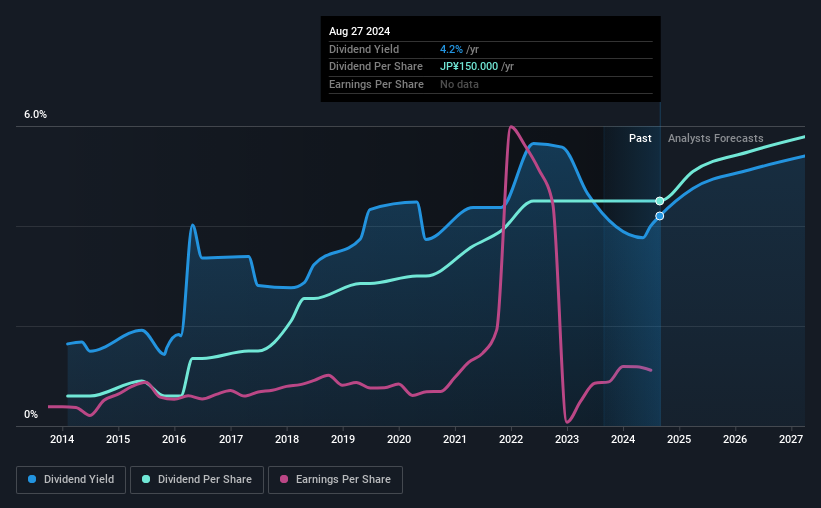
The board of SBI Holdings, Inc. (TSE:8473) has announced that it will pay a dividend of ¥30.00 per share on the 18th of December. Based on this payment, the dividend yield on the company's stock will be 4.2%, which is an attractive boost to shareholder returns.
See our latest analysis for SBI Holdings
SBI Holdings' Payment Has Solid Earnings Coverage
If the payments aren't sustainable, a high yield for a few years won't matter that much. Based on the last payment, SBI Holdings was quite comfortably earning enough to cover the dividend. This means that a large portion of its earnings are being retained to grow the business.
Over the next year, EPS is forecast to expand by 12.7%. If the dividend continues along recent trends, we estimate the payout ratio will be 60%, which is in the range that makes us comfortable with the sustainability of the dividend.

Dividend Volatility
The company's dividend history has been marked by instability, with at least one cut in the last 10 years. The annual payment during the last 10 years was ¥20.00 in 2014, and the most recent fiscal year payment was ¥150.00. This implies that the company grew its distributions at a yearly rate of about 22% over that duration. Dividends have grown rapidly over this time, but with cuts in the past we are not certain that this stock will be a reliable source of income in the future.
SBI Holdings Could Grow Its Dividend
Growing earnings per share could be a mitigating factor when considering the past fluctuations in the dividend. SBI Holdings has impressed us by growing EPS at 6.6% per year over the past five years. Since earnings per share is growing at an acceptable rate, and the payout policy is balanced, we think the company is positioning itself well to grow earnings and dividends in the future.
We should note that SBI Holdings has issued stock equal to 11% of shares outstanding. Regularly doing this can be detrimental - it's hard to grow dividends per share when new shares are regularly being created.
In Summary
In summary, we are pleased with the dividend remaining consistent, and we think there is a good chance of this continuing in the future. While the payout ratios are a good sign, we are less enthusiastic about the company's dividend record. Taking all of this into consideration, the dividend looks viable moving forward, but investors should be mindful that the company has pushed the boundaries of sustainability in the past and may do so again.
Investors generally tend to favour companies with a consistent, stable dividend policy as opposed to those operating an irregular one. However, there are other things to consider for investors when analysing stock performance. Taking the debate a bit further, we've identified 2 warning signs for SBI Holdings that investors need to be conscious of moving forward. Is SBI Holdings not quite the opportunity you were looking for? Why not check out our selection of top dividend stocks.
New: Manage All Your Stock Portfolios in One Place
We've created the ultimate portfolio companion for stock investors, and it's free.
• Connect an unlimited number of Portfolios and see your total in one currency
• Be alerted to new Warning Signs or Risks via email or mobile
• Track the Fair Value of your stocks
Have feedback on this article? Concerned about the content? Get in touch with us directly. Alternatively, email editorial-team (at) simplywallst.com.
This article by Simply Wall St is general in nature. We provide commentary based on historical data and analyst forecasts only using an unbiased methodology and our articles are not intended to be financial advice. It does not constitute a recommendation to buy or sell any stock, and does not take account of your objectives, or your financial situation. We aim to bring you long-term focused analysis driven by fundamental data. Note that our analysis may not factor in the latest price-sensitive company announcements or qualitative material. Simply Wall St has no position in any stocks mentioned.
About TSE:8473
SBI Holdings
Engages in the online securities and investment businesses in Japn and Saudi Arabia.
Undervalued with solid track record and pays a dividend.


